On the 70th anniversary of Wilhelm Furtwängler's death

Wilhelm Furtwängler died of pneumonia in Ebersteinburg (Baden-Baden) on 30 November 1954 at the age of 68. A tribute by Wolfgang Schreiber can be found here.
Special offer edition 'Wilhelm Furtwängler in historical audiovisual documents' extended for members
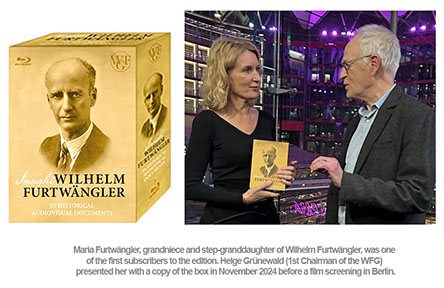
The edition 'Wilhelm Furtwängler in historical audiovisual documents', published in December 2024, contains film material with the famous conductor as well as excerpts from conversations and memories of contemporary witnesses on three Blu-Ray discs.
Members of the WFG can purchase the edition until 31 January 2025 at a special price of €60 (plus handling). Detailed information can be found here.
Two facsimile copies of Furtwängler's scores
Our society member Henning Smidth has published a copy of Furtwängler's conducting score of Schumann's Fourth Symphony and the conducting score of Bruckner's Fifth Symphony. You can find more details here.
Gerhard Mues (1935 - 2024)
The Wilhelm Furtwängler Society mourns the loss of Dr. Gerhard Mues, who died on April 5, 2024 in Berlin. Mues was one of the music enthusiasts who founded the "Society of Friends of Wilhelm Furtwängler" in 1976, which later renamed itself the "Wilhelm Furtwängler Society". Please find an obituary here.
"The complete Wilhelm Furtwängler on record"
Warner Classics released "Furtwängler's complete live and studio recordings" in a comprehensive edition on 55 CDs. "It is not only the first collection to bring together Furtwängler's entire catalogue of studio recordings, but also includes all the live recordings he made with a view to commercial release" (press text). Extensive research, involving experts from Furtwängler's societies in France, Germany and Japan, has opened up new sources and newly discovered material - for example, previously unpublished recordings made in Vienna and Copenhagen. Each recording has been completely and carefully remastered in high definition. The booklet offers two extensive contributions as well as a number of (in part hardly known) Furtwängler photos. Zwei ausführliche Besprechungen finden Sie hier:
MusicWeb International
Klangrede - für Klassikliebhaber
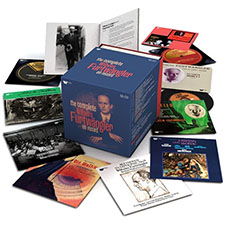
Found Pieces # 3
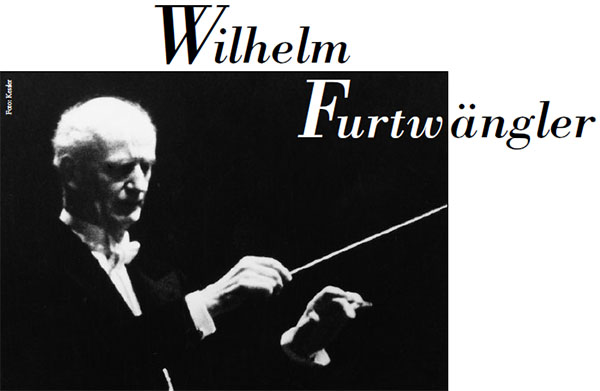
The music magazine "FonoForum" paid tribute to Wilhelm Furtwängler in several articles in issue 3/1999. The texts have lost none of their significance even 22 years later. We are pleased to be able to make them available to our members and thank REINER H. NITSCHKE Verlags-GmbH for permission to publish them FonoForum. They are only available in German.
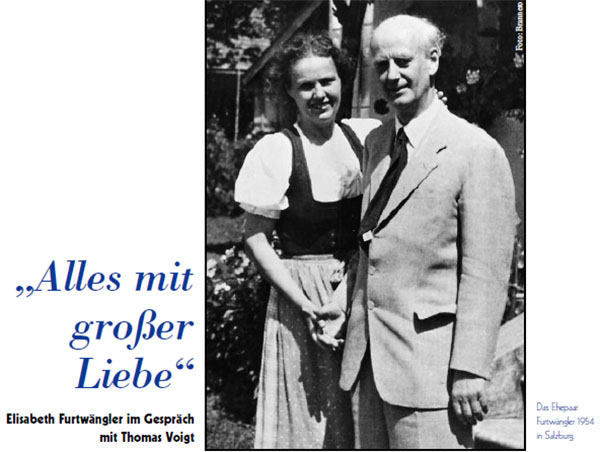
New CDs from The Wilhelm Furtwängler Centre of Japan
Since 2004, The Wilhelm Furtwängler Centre of Japan ("WFCJ") has been engaged in making available all the 78rpm recordings made by Furtwängler on CD "Hiyama Collection", which was triggered by Mr. Kosuke Hiyama, one of the most distinguished Furtwängler scholars and Centre's advisor, who donated his 78rpm and vinyl collections to the Centre. The transfers have been made with the most advanced technologies and know-how that the Centre that we gained over the years.
The most recent titles are the 21st and 22nd collection in the series:
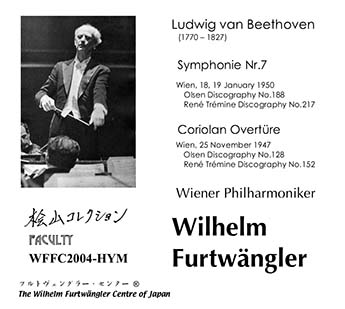 |
WFFC2004-HYM contains the same performances as WFFC1403-HYM, Beethoven's Symphony No. 7 + Coriolan Overture. As the original 78rpms were at the time manufactured at wrong pitch of A=454~455, which was adjusted to A=443, the pitch we imagine to be correct at the time of recording in 1950.
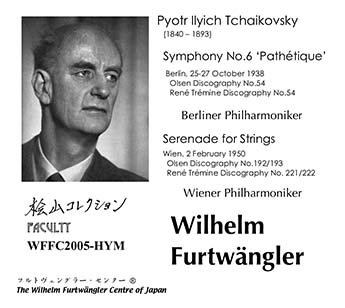 |
WFFC2005-HYM contains the same performances as in the WFFC1404-HYM, Tchaikovsky's Symphony No. 6 "Pathétique" + Serenade excerpts. For "Pathétique", the Centre transferred an excellent quality Australian issue. The serenade excerpts are from pristine quality 45RPM LPs.
WFG members who are interested in those issues should contact WFCJ info@furt-centre.com Attn. Mr. Masayuki Nakamura, President, directly for inquiry.
Found Pieces # 2
Alfred Brendel on Furtwängler
Alfred Brendel (born 1931) is not only an exceptional artist as a pianist, but also a writer of distinction. Brendel wrote in 1979 on the 25th anniversary of Wilhelm Furtwängler's death an essay, succinctly titled "Furtwängler". We are publishing this text, which first appeared in English, then in German, and thank the artist for allowing us to make this tribute to Furtwängler available to our members. You can find the text here for download.
Found Pieces # 1
To begin with, we publish a fundamental text by Roberto Menna Barreto: Wilhelm Furtwängler - Prophet in an Age of Dissolution.
Roberto Menna Barreto (1935 - 2015), lawyer, advertising expert, journalist, transactional analyst, was a great music lover and admirer of Wilhelm Furtwängler. At the time, he was the only Latin American member of the Wilhelm Furtwängler Society. Barreto dealt with musical issues in lectures, events and essays in his country Brazil. His essay on Furtwängler was written on the occasion of the 100th anniversary of the Berlin Philharmonic Orchestra 1982. It was printed and distributed in the form of a small brochure with the support of Deutsche Lufthansa in Brazil.
You can find the original Portuguese text (2.6 Mb) here for download.
Wilhelm Furtwängler and the magnetophone
Wilhelm Furtwängler was sceptical about music recorded in a studio. He relied on the living performance in the concert hall. Most of the testimonies of his art are concert recordings. Friedrich Engel draws our attention to Furtwängler's experiences with the new magnetic sound recording. You can read the slightly revised version of his essay "Prelude and Finale" here ...
Prelude and Finale - a question of dates
Stirring interpretation and technical monument - or foreboding of inevitable catastrophe? A Brahms recording by Wilhelm Furtwängler could be four years older than assumed. Read the text in an updated version with new findings here ...
Friedrich Engel worked for five years as a sound technician in the public broadcasting service before taking on a new field of work as a technical editor at the Agfa-Gevaert Group. During most of his professional life he worked as an application engineer for magnetic tape at BASF AG. After successful technical-historical publications, he is now working in retirement intensively on the history of magnetic sound recording.
100 years ago:
Wilhelm Furtwängler becomes artistic director of the Berliner Philharmoniker
100 years ago, on 20 March 1922, Wilhelm Furtwängler took over the artistic direction of the Berlin Philharmonic. He was thus, in direct succession to Arthur Nikisch, the third principal conductor of the "Berlin Philharmonic Orchestra" (as the orchestra was called until its transformation into a foundation under public law in 2002), which was founded in 1882. Furtwängler was artistic director of the orchestra from 1922 to 1945 and from 1951 until his death in 1954. In Deutschlandfunk's "Kalenderblatt", Wolfgang Schreiber commemorates Furtwängler's appointment as chief conductor of the philharmonic orchestra. You can listen to and read the contribution on the station's website, but only in German www.deutschlandfunk.de.
In memorium Kurt-Victor Selge (1933 - 2022)
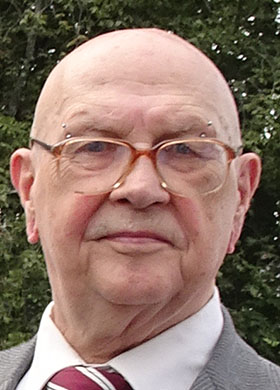
Prof. Dr Kurt-Victor Selge, First Chairman of the WFG from 2005 to 2017, died in Berlin on 5 April 2022. Born in Bremen in 1933 as the son of a pastor, he grew up in Hamburg. He initially studied history, philosophy and German studies in Hamburg, but then switched to theology in Heidelberg. After gaining his doctorate and habilitation as well as teaching at various universities, he became a full professor of church history at the Kirchliche Hochschule Berlin in 1977, which became part of the Faculty of Theology at Humboldt University after Germany's reunification. He taught there until his retirement in 2001. Victor Selge was also a founding member of the Berlin-Brandenburg Academy of Sciences in 1993.
In the 12 years of his tenure, Selge decisively influenced and developed the work of the Society. There was an intensifying collaboration with the Berlin Philharmonic and the Furtwängler Societies in France and Japan. Victor Selge was an homme de lettre whose special gifts included making the interpretations of Wilhelm Furtwängler, whom he himself had experienced as a young man, accessible to a wide audience. He wrote many profound contributions for the WFG's recordings. Even after his retirement from the board, Selge continued to take a lively interest in the work of the WFG until he had to withdraw more and more for health reasons.
Beethovens Ninth, conducted by Furtwängler, Bayreuth 1951
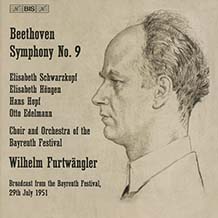 71 years ago, on July 29, 1951, Wilhelm Furtwängler conducted Beethoven's Ninth Symphony in a concert to mark the reopening of the Bayreuth Festival, which was taking place for the first time after seven years.
71 years ago, on July 29, 1951, Wilhelm Furtwängler conducted Beethoven's Ninth Symphony in a concert to mark the reopening of the Bayreuth Festival, which was taking place for the first time after seven years.
The concert was broadcast by Bayerischer Rundfunk and around the world, including Swedish radio. CD releases of the concert were issued by EMI, Toshiba, and recently the Wilhelm Furtwängler Centre of Japan (WFHC-013, available from WFG). Now the recording is released in a new sonic form by BIS.
"Using the analog mono tape digitized by Swedish Radio, this CD reproduces the broadcast as it would have been heard by listeners in Sweden: We have chosen not to change anything, not to "polish up" the sound, not to clean up and shorten the pauses or omit audience noise within the music, but to leave the original as it was. In this way, we hope to convey the feeling of actually sitting in front of an old radio in 1951 and listening to this important concert - a true historical document" (BIS information).
Philippe Jacquard, a great Furtwängler connoisseur, has reviewed this new release in detail:
www.hdarchivesconcerts.fr
Furtwängler's studio recordings for Deutsche Grammophon
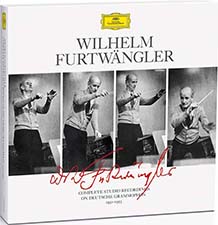 Wilhelm Furtwängler made only four recordings Only four recordings was made with the Berlin Philharmonic for Deutsche Grammophon (DG) in the post-war period. These are interpretations of works from the conductor's core repertoire which may be described as "legendary".
Wilhelm Furtwängler made only four recordings Only four recordings was made with the Berlin Philharmonic for Deutsche Grammophon (DG) in the post-war period. These are interpretations of works from the conductor's core repertoire which may be described as "legendary".
Schubert's "Great" C major Symphony (No. 8, former No. 9), Schumann's Symphony No. 4 in D minor, Haydn's Symphony No. 88 in G major and Furtwängler's Second Symphony. The recordings, made between 1951 and 1953, have lost none of their fascination almost seven decades later. Deutsche Grammophonhas reissued them in a limited and numbered vinyl deluxe edition (4 LP). All records were made from masters of the original tapes as 180 g pressings and each has its own cover, based on the original record sleeve. The box contains an accompanying text by Helge Grünewald and facsimiles of the original recording logs.
Board elections 2021
In the general assembly of the WFG, which took place on 28 May 2021 (digitally for the first time), the board was newly elected. Re-elected were Dr. Helge Grünewald (1st Chairman), Dr. mult. Reinhard Niemann (2nd Chairman), Peter Kübler (Treasurer). Wolfgang Hainer is a new member of the Board as 3rd Chair.
In memoriam: Friedhelm Schöning
(15.10.1936 - 15.3.2021)
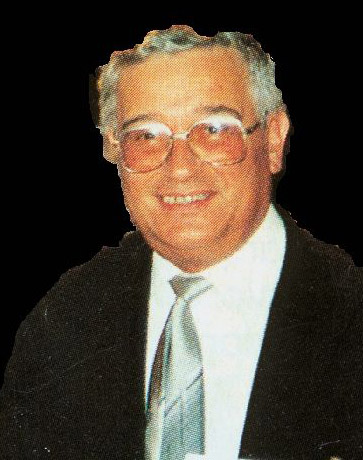
Dr. Friedhelm Schöning, long-time First Chairman of the Wilhelm Furtwängler Society, died on 15 March after a long illness at the age of 84. Born in Berlin, he studied medicine in Heidelberg, completed his training as a specialist in neurology and psychiatry in his home town and then worked there for decades in his own practice. Attending a concert of the Berlin Philharmonic conducted by Wilhelm Furtwängler in the Titania Palast sparked the young man's interest and enthusiasm for Furtwängler. With other music enthusiasts, Schöning founded the "Society of Friends of Wilhelm Furtwängler" in 1976, which later changed its name to the "Wilhelm Furtwängler Society". He and his friends in the society tirelessly searched for documents and concert recordings of the Berlin Philharmonic with Wilhelm Furtwängler that had not yet been published or had only been published in poor quality at the time. They found them in the archives of the Berlin radio stations SFB and RIAS. Thus, many recordings of the famous conductor appeared, partly in collaboration with the Furtwängler societies in France and Japan, first on long-playing discs and then on compact discs. Friedhelm Schöning maintained contact with the Furtwängler family for many years and regularly visited Elisabeth Furtwängler, the conductor's widow, in Clarens on Lake Geneva. In addition to music, he had wide-ranging cultural interests and travelled to places of cultural and historical significance. After a spinal operation in 2014, he was physically very limited and had to rely on a wheelchair. He continued to take part in the work of the WFG until the end and gave it many suggestions.
Herbert Haffner's Furtwängler
New Edition
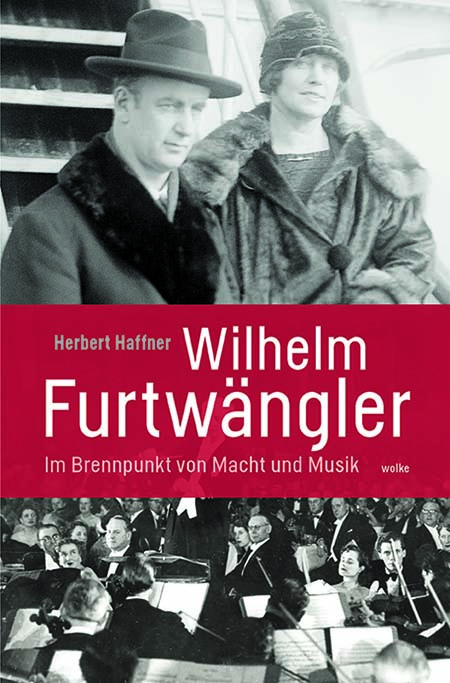
The interest in Wilhelm Furtwängler is still awake and even great. His recordings are bought in old and new editions, essays and books about him are published, read and discussed. Last but not least, there is an undiminished vehemence and controversy about his role in the years 1933 to 1945 - objective, thoughtful, pondering, but also less objective and polemical.
Herbert Haffner has revised and greatly expanded his Furtwängler biography, first published in 2003. After extensive studies of sources and discussions with contemporary witnesses, he is able to correct a large number of long-established errors and comes to new insights about the artist Wilhelm Furtwängler. Furtwängler's relationship to various fellow conductors and his attempt to establish an 'anti-Bayreuth' in Salzburg, which Hitler prevented, are also examined. A detailed bibliography and a discography can be found in the appendix.
Members of the Wilhelm Furtwängler Society can purchase the book at a 25% discount. Instead of 46,00 € the book then costs only 34,50 € plus 4,50 € shipping costs, i.e. 39,00 €. Please send your order directly to us: info[at]furtwaengler.org
Wilhelm Furtwängler
Complete Recordings on Deutsche Grammophon and Decca
34 CD + 1 DVD
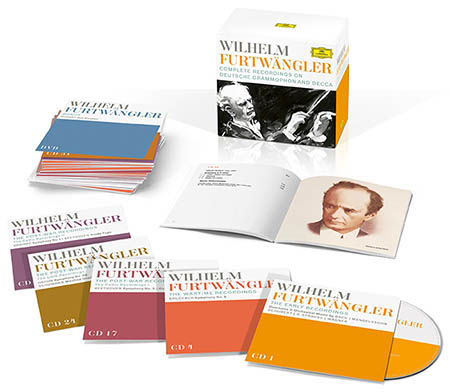
This edition presents all of Furtwängler's recordings for Deutsche Grammophon and Decca, made between 1926 and 1954. 34 CDs and a DVD (Mozart's opera "Die Zauberflöte") document and present his musical legacy on the occasion of Furtwängler's 65th birthday. According to DG, the edition also includes Japanese remasterings that were previously difficult to access or out of print.
Further information:
Deutsche Grammophon
Trailers and Interviews
Wilhelm Furtwänglers: The Radio Recordings 1939-1945 Remastered - 22 SACD - 184p book
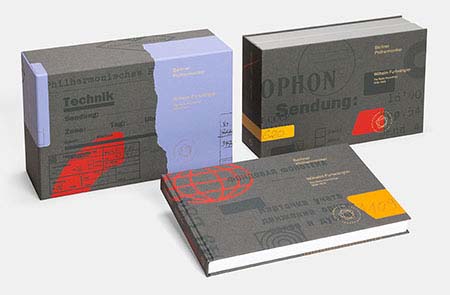
The Berliner Philharmoniker have released a 22 CD / SACD Wilhelm Furtwängler Edition in February. This edition comprises all radio recordings of the Berliner Philharmoniker with their chief conductor in the war years 1939 to 1945. It is a total of 21 concerts complete or in part. The recordings, tapes or tape copies of the Reichs-Rundfunk-Gesellschaft (RRG) have been revised for this release. The focus is on interpretations of the German repertoire of the 19th century, with symphonies and solo concertos by Beethoven, Brahms, Bruckner and Schubert.
Technologically, the release is based on the best available sources - especially the original tapes of the RRG, which were taken after the war into the Soviet Union. They were rediscovered there in the 1980s by the music editor of the Berlin Radio SFB, Klaus Lang. The early 1990s they were given back and returned to Germany, and some were released soon by Deutsche Grammophon (DG). For the edition of the Berliner Philharmoniker the recordings were digitally sampled using state-of-the-art technology, carefully restored and remastered in 24-bit resolution.
The elaborate edition contains an accompanying book with articles on Wilhelm Furtwängler's interpretations, the development of magnetophone technology and historical photos. It is available at the Berliner Philharmoniker Recordings Shop of the Philharmonie Berlin and in selected retailers. Members of the Wilhelm-Furtwängler-Gesellschaft can buy them with a 10% discount on the regular selling price of 229 €. Please contact us at: info(at)furtwaengler.org.
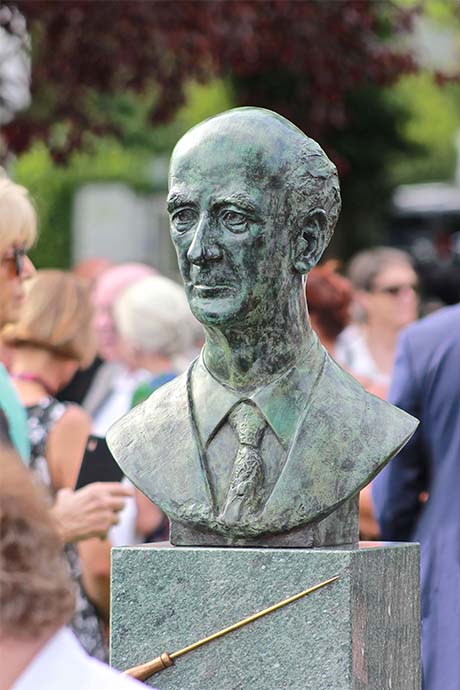
In a solemn ceremony a memorial bust for Wilhelm Furtwängler was unveiled on 28 August 2016 in Clarens/Montreux. The bust was created by the Swiss artist Bernard Bavaud who had already modeled Charlie Chaplin, Igor Stravinsky and Richard Strauss, among others. The project was initiated by the late Karl-Ivo Dane, a long-time member of the WFG and a great admirer of Furtwängler. As location a place at the harbour of Clarens was chosen - where Furtwängler liked to relax while promenading.
The ceremony was attended by members of the Furtwängler family and the Dane family, the sculptor, the chairmen of the German Wilhelm-Furtwängler-Gesellschaft and the Furtwängler Centre of Japan. The City of Montreux was represented by its Mayor Laurent Wehrli, the Federal Republic of Germany by Honorary Consul Jean Marc Probst. In a concert of the Montreux Festival the Royal Philharmonic Orchestra London, conducted by Charles Dutoit, performed the Second Movement (Andante semplice) of Furtwängler's Second Symphony.
Wilhelm Furtwängler’s Symphonies on 3 CDs –
Special Offer
George Alexander Albrecht, a renowned adept of the works by Wilhelm Furtwängler, has recorded Furtwängler’s symphonies with the Staatskapelle Weimar in the years 1998, 2000 and 2003. We offer you these recordings at a special price:
| Symphony Nr. 1 | 2 CDs | 16 € |
| Symphony Nr. 2 | 2 CDs | 16 € |
| Symphony Nr. 3 | 1 CDs | 10 € |
Please order at:
info[at]furtwaengler-gesellschaft.de
Beethoven interpretations by Wilhelm Furtwängler on Vinyl
Increasingly, recordings of Wilhelm Furtwängler are also released again on Vinyl. Two exemplary Beethoven interpretations were published by Warner Classics, the successor to the EMI. Ludwig van Beethoven was one of the guiding stars of the conductor Wilhelm Furtwängler. He performed the symphonies again and again with different orchestras. The Ninth was frequently performed by the Berliner Philharmoniker under Furtwängler's direction. But he never recorded the work in the studio. The recording of the Bayreuth Festival of 1951 is considered particularly impressive.
| Beethoven: Symphony No. 9 in D Minor op. 125 Elisabeth Schwarzkopf, Elisabeth Höngen, Hans Hopf, Otto Edelmann Chor und Orchester der Bayreuther Festspiele Wilhelm Furtwängler Warner Classics 190295 895730 |
2 LP |
Beethoven's Fifth Symphony played a special role not only in the repertoire of Wilhelm Furtwängler, but in the history of music recording. In 1913, the Berlin Philharmonic, with its then chief conductor Arthur Nikisch, recorded the work as the first symphony for the new medium disc. The so-called fate symphony accompanied the entire career of Wilhelm Furtwängler. In the spring of 1954, a few months before his death, the studio production of the Fifth was created in the Great Hall of the Wiener Musikverein with the Vienna Philharmonic.
| Beethoven: Symphony No 5 in C Minor op. 67 Wiener Philharmoniker Wilhelm Furtwängler Warner Classics 190295 895723 |
1 LP |
Sensational Archive Discovery
Furtwängler conducts Schumann and Beethoven in Luzern 1953
A sensational discovery in the archives of the Lucerne Festival with two of Furtwängler's all-time favourites: a live recording of the Manfred Overture (1953), presumed lost until recently and now released for the very first time, alongside Beethoven's »Eroica« and Schumann's Fourth Symphonies, remastered for the first time using the original tapes.
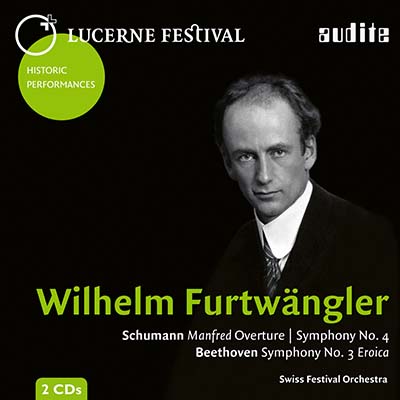
It is the desire of many Furtwängler fans to experience the atmosphere and aura of the performances also in the recordings to a maximum extend. This goal serves the SACD with two additional tracks, which will be released February 2018: The atmosphere of Furtwängler's stage appearance and applause, followed by increasing silence of the audience at the beginning of the works create special ambience and the air of a live performance.
_________________________________________
Furtwängler-Edition - 14 LP-Box
With the great demand for the LP version of their internationally successful Furtwängler 12-CD boxed set, audite now
presents a selection of recordings in LP format for audiophile vinyl enthusiasts. Containing compositions by Beethoven,
Bruckner, Schubert, Brahms and Wagner, the LP boxed set presents the principal
works of the CD boxed set. The majority of the concerts given by Wilhelm Furtwängler and the Berlin Philharmonic
between 1947 and 1954 were recorded by the RIAS Berlin. The original tapes from the RIAS archives have been made
available for the first time for this edition so these recordings also offer unsurpassed technical quality.
14 LP-Box, audite 87.101
Bruckner’s Fifth Symphony in ideal sound quality
Im early 2011 Wilhelm Furtwängler’s interpretation of Anton Bruckner’s Fifth Symphony was released. It is the live recording of a concert by the Berlin Philharmonic from October 1942. We have been able to locate a copy of a tape which is much better than the one previously known. The CD was released as a recording by the Wilhelm-Furtwängler-Gesellschaft (only available to members).
CD-Booklet
In order to make this eminent document of Furtwängler’s interpretative art accessible to a wider public the recording was released in parallel by the English label Testament.
www.Testament.co.uk
"Open Wounds"
Wilhelm Furtwängler and Thomas Mann
Prof. Dr. Klaus Kanzog, specialist in German Studies, will give a lecture on this topic on Sunday, 12 May 2013 at 11 a.m. at the Südfoyer of the Philharmonie Kammermusiksaal. This lecture is organised by the Wilhelm-Furtwängler-Gesellschaft, in co-operation with the Berlin Philharmonic Foundation.
Admission free.
The lecture recalls the politico-cultural situation of the years 1944 to 1947 in Germany and Switzerland. It recapitulates aspects of Furtwängler denazification-procedure in Berlin and attempts to qualify the positions of the conductor who had remained in Germany, and of the author Thomas Mann who had been impelled to exile.
_________________________________________
Elisabeth Furtwängler
[20.12.1910 - 5.3.2013]
Elisabeth Furtwängler was an eminent guardian of the heritage of the unparalleled conductor Wilhelm Furtwängler, and her passing is met with heartfelt sympathies by the Wilhelm-Furtwängler-Gesellschaft and its fellow societies in France and Japan. She was the centre of a large family from her first marriage to Hans Ackermann fallen in Strasbourg as early as 1940, followed by the union with Wilhelm Furtwängler in 1942/43. The re-discovery of this great and highly-educated musician acoustic and written heritage, beginning some ten years after his death and continually growing up to this day, owes more than five decades of ample stimuli to his widow. It gives solace to know that until an age of 103 Elisabeth Furtwängler continued to be in alert and lively contact with her family and her numerous friends, and that her parting has been brief, with a clear state of mind and full of gratitude.
